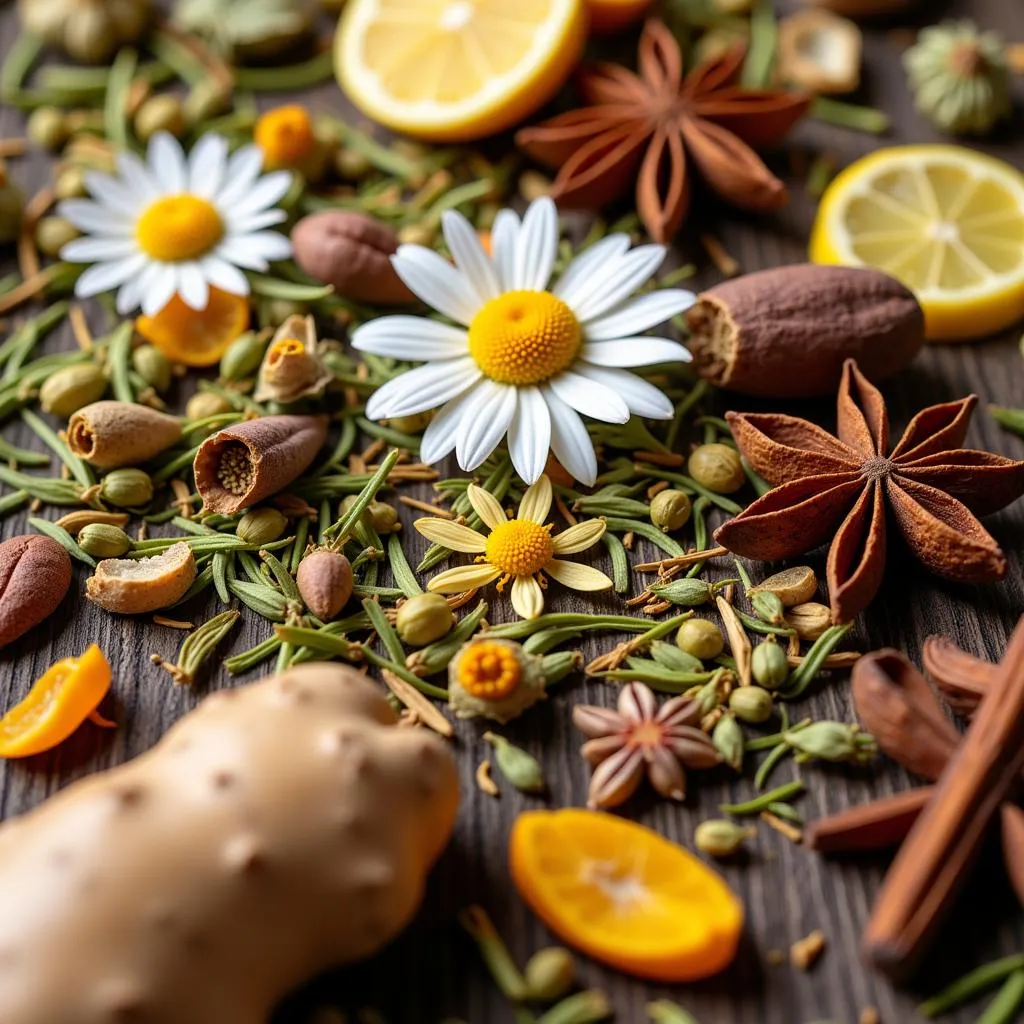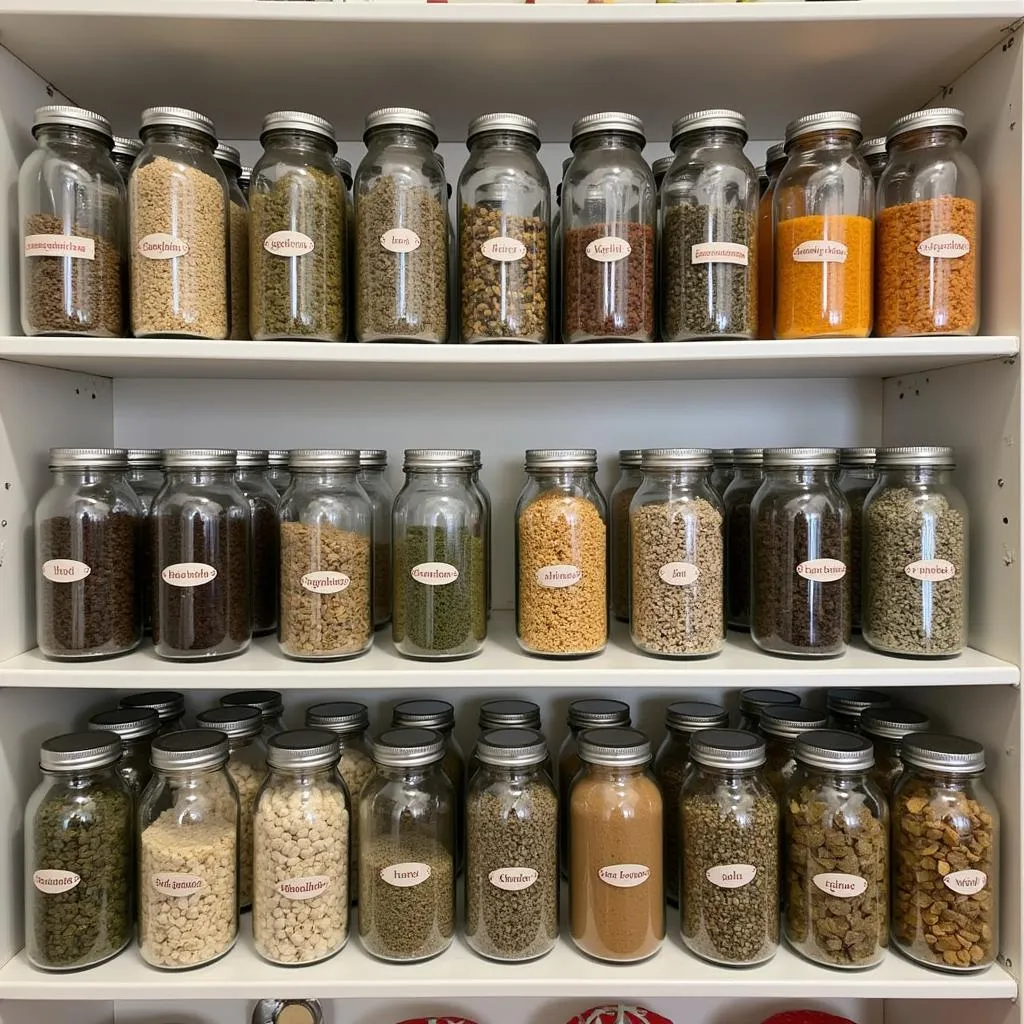Herbal Foods have been a cornerstone of traditional medicine and culinary practices for centuries. From the fragrant spices of India to the delicate herbs of the Mediterranean, cultures around the world have revered the power of plants to enhance flavor, promote well-being, and even treat ailments. But what exactly are herbal foods, and how can incorporating them into your diet benefit you?
Delving into the World of Herbal Foods
Simply put, herbal foods are plants or parts of plants that are incorporated into our diets for their flavor and potential health benefits. These can range from everyday spices like turmeric and ginger to more specialized herbs like chamomile and echinacea.
Unlike pharmaceutical drugs that isolate specific compounds, herbal foods offer a symphony of naturally occurring vitamins, minerals, antioxidants, and phytochemicals that work synergistically to support our bodies.
 Herbal Tea Ingredients
Herbal Tea Ingredients
The Allure of Herbal Foods: Why They’re Gaining Popularity
In an age where we’re increasingly conscious of what we put into our bodies, it’s no surprise that herbal foods are experiencing a resurgence. Here’s why:
- Holistic Approach to Health: Herbal foods align with a holistic approach to well-being, focusing on nourishing the body from within and addressing the root causes of imbalances.
- Natural Origins: Many people are drawn to the natural origins of herbal foods, preferring plant-based remedies over synthetic alternatives.
- Culinary Versatility: From savory dishes to sweet treats, herbal foods effortlessly weave their way into diverse cuisines, adding depth and complexity to our meals.
- Sustainable Practices: Growing your own herbs or sourcing them from local farmers promotes sustainable practices and reduces your environmental footprint.
Reaping the Rewards: Exploring the Potential Benefits of Herbal Foods
While scientific research on the specific health benefits of herbal foods is ongoing, anecdotal evidence and traditional knowledge highlight their potential in several areas:
- Boosting Immunity: Herbs like elderberry, astragalus, and echinacea are traditionally used to strengthen the immune system and ward off infections.
- Reducing Inflammation: Turmeric, ginger, and boswellia are renowned for their anti-inflammatory properties, potentially easing symptoms of inflammatory conditions.
- Supporting Digestion: Peppermint, ginger, and fennel are known to soothe digestive discomfort and promote healthy digestion.
- Enhancing Cognitive Function: Gotu kola, rosemary, and ginkgo biloba are believed to enhance memory, focus, and overall cognitive function.
 Woman Enjoying Herbal Infused Water
Woman Enjoying Herbal Infused Water
Incorporating Herbal Foods: Simple Ways to Elevate Your Wellness Routine
Integrating herbal foods into your daily life doesn’t require a complete dietary overhaul. Here are some effortless yet impactful strategies:
- Start with Spices: Experiment with different spices like turmeric, ginger, cumin, and coriander to add depth of flavor and potential health benefits to your meals.
- Embrace Herbal Teas: Swap your usual cup of coffee or black tea for a soothing herbal infusion like chamomile, peppermint, or rooibos.
- Grow Your Own Herb Garden: Create a miniature sanctuary of fresh herbs right in your backyard or windowsill for easy access to culinary and medicinal plants.
- Incorporate Herbal Supplements: If you struggle to consume enough herbs through your diet, consider incorporating high-quality herbal supplements after consulting with your healthcare provider.
Navigating the World of Herbal Foods: A Note of Caution
While generally safe when used appropriately, it’s crucial to approach herbal foods with a discerning eye:
- Quality Matters: Source your herbs from reputable suppliers who prioritize organic farming practices and rigorous quality control.
- Dosage Considerations: Start with small amounts of any new herb and gradually increase your intake to assess your tolerance and identify potential side effects.
- Potential Interactions: Be mindful of potential interactions between herbs and medications you’re currently taking. Consulting with a qualified healthcare professional is always advisable.
 Various Dried Herbs in Jars
Various Dried Herbs in Jars
Conclusion: Embracing the Power of Nature’s Pharmacy
In a world often dominated by synthetic solutions, herbal foods offer a refreshing return to the wisdom of nature. By embracing these plant-based allies, we can nourish our bodies, tantalize our taste buds, and embark on a journey of holistic well-being.
FAQs About Herbal Foods
1. Are herbal foods a substitute for conventional medicine?
Herbal foods are not intended to replace conventional medicine. They can complement a healthy lifestyle and may offer supportive benefits, but it’s crucial to consult with your healthcare provider for any health concerns.
2. Where can I find reliable information about herbal foods?
Reputable sources of information include books, scientific journals, and websites of trusted herbalism organizations.
3. Can I grow my own herbal foods?
Absolutely! Growing your own herbs is a rewarding experience that allows you to control the quality and freshness of your ingredients.
4. Are there any risks associated with using herbal foods?
While generally safe when used appropriately, herbal foods can interact with certain medications or have side effects. Always consult with your healthcare provider before incorporating new herbs into your routine.
5. How can I learn more about using herbal foods safely and effectively?
Consider consulting with a qualified herbalist or healthcare professional with expertise in herbal medicine.
Looking for ways to incorporate the power of herbs into your beauty routine? Check out our article on food for soft serum!
Need personalized guidance on your journey to incorporating herbal foods? Contact us at Phone Number: 02437655121, Email: minacones@gmail.com Or visit our address: 3PGH+8R9, ĐT70A, thôn Trung, Bắc Từ Liêm, Hà Nội, Việt Nam. Our dedicated customer support team is available 24/7 to assist you.